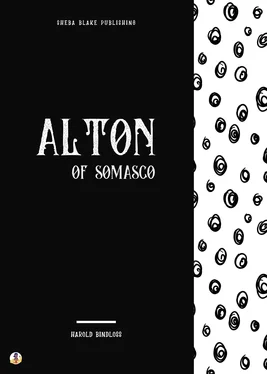“When,” said Townshead smiling, “I was a King in Babylon.”
“No,” said Alton reflectively. “You’re a little late on time. The Christian slave don’t quite fit in.”
Townshead glanced at him sharply, and said nothing, for the rancher had once or twice already somewhat astonished him.
“Well,” said Alton, “tell me, Miss Nellie, were the lilies where the ashes hung over the lake? I want to know all about Carnaby.”
The girl seemed somewhat thoughtful, and a trifle astonished, but she made the best use of her memory, and Alton listened gravely. “Yes,” he said. “I seem to see it. The rose garden on the south side, the big lawn, and the lake. There’s a little stream on the opposite side of it that comes down through the fern from the big beech wood.”
“But,” said the girl, “how could you know that?”
“I think I must have dreamt it,” said Alton gravely. “Or perhaps my father told me. He used to talk of Carnaby, and I feel I know it well.”
The girl stared at him in her wonder. “But what is Carnaby to you?” she said.
Alton rose up, and stood still a moment, somewhat grim in face. “It should have been my father’s, and now when I don’t know that I want it, I think it’s mine,” he said. “Anyway, I’m kind of tired, and I think I’ll turn in. Excuse me.”
He went out, and Nellie Townshead glanced at his comrade. “Do you know what he means?” she said.
Seaforth smiled and shook his head. “I’ve never seen Harry taken that way before,” he said. “Still, we’ll hope he’ll be better to-morrow. He has been through a good deal to-day.”
Miss Townshead did not appear contented, but she changed the topic. “Then what did you mean when you spoke about the dress packet?”
“I’ll tell you,” said Seaforth, “if you don’t tell Harry. Well, when the packet slipped down to the edge of the big drop I’m not sure that the price of two ranches would have induced most men to follow it.”
“But why did Mr. Alton go?” said the girl, with an expression which was not quite the one the man had expected to see in her face.
Seaforth smiled. “He may have fancied you wanted it. Anyway, Harry is a little obstinate occasionally, and when a thing looks difficult he can’t resist attempting it. In the language of my adopted country that’s the kind of man he is. Now I think I had better go after him, because I fancy he wants soothing after that last speech of his.”

The sun was on the hill slopes, and there was a dazzling glare of snow, when Miss Alice Deringham stood with her travelling dress fluttering about her on the platform of the observation car as the Pacific express went thundering down a valley of British Columbia. The dress, which was somewhat dusty, had cost her father a good deal of money, and the hat that was sprinkled with cinders had come from Paris; while the artistic simplicity of both had excited the envy of the two Winnipeg ladies who, having failed to make friends with Miss Deringham during the journey, now sat watching her disapprovingly in a corner of the car. The girl was of a type as yet not common in Western Canada, reserved, quietly imperious, and annoyingly free from any manifestation of enthusiasm. She had also listened languidly to their most racy stories with a somewhat tired look in her eyes.
They were, however, fine eyes of a violet blue, and gold hair with a warmer tinge in it clustered about the broad white forehead, while the rest of the girl’s face was refined in its modelling, if a trifle cold in expression and colouring. Miss Deringham was also tall, and as she stood with one little hand on the rail and the other on the brim of the hat the wind would have torn away from her, her pose displayed a daintily-proportioned figure. The girl was, however, as oblivious of her companions as she was of the dust, and her eyes were at last keen with wonder. She had seen nothing which resembled the panorama that unrolled itself before her as the great mountain locomotives sped on through the primeval wilderness, and the wild beauty of it left a deeper mark on her because her Canadian journey had been more or less a disappointment.
Alice Deringham had tasted of the best that England had to offer in the shape of sport and scenery, art and music, and had grown a little tired of it all; while, when her father had announced his intention of crossing the Canadian Dominion, partly on an affair of business and partly for the benefit of his health, she had gladly accompanied him in the hope of seeing something new. Deringham was a promoter and director of English companies, but his daughter having the fine disdain for anything connected with finance which occasionally characterizes those who have never felt the lack of money, asked him a few questions concerning one object of his journey. She only knew that the Carnaby estate, which would in the usual course have reverted to her, had been unexpectedly willed to the son of a man its late owner had disinherited, on conditions. The man, it appeared, was dead, and Deringham desired to see whether any understanding or compromise could be arrived at with the one son he had left behind in Western Canada.
To become the mistress of Carnaby Hall would have pleased Alice Deringham, but, as she had already realized there was no great hope of that, she had prepared to enjoy her Canadian journey. It had, however, fallen short of her expectations. Ontario reminded her of southern Scotland, and there was nothing to impress one who had seen the Highlands when the cars ran into the confusion of rock and forest, lake and river, along the Superior shore. Winnipeg in no way appealed to her, and she grew weary as they swept out past straggling wooden towns into the grass lands of the West.
The towns rose stark from the prairie in unsoftened ugliness, and there was nothing to stir the imagination in the great waste of sun-bleached grass. Day by day, while the dust whirled by them, and the gaunt telegraph posts came up out of the far horizon and sank into the east, they raced across the wide levels. The red dawns burned behind them, the sunsets flamed ahead, and still there was only dust and grass, chequered here and there with bands of stubble, while driving grit and ugliness were the salient features of the little stations they stopped at.
Miss Deringham had read enough to learn that pistol and bandolier had long gone out of fashion in Western Canada, where, indeed, they had rarely formed a necessary portion of the plainsman’s attire, but she had expected a little vivid colour and dash of romance. The stock-riders she saw at the station were, however, for the most part dress in faded jean, and many of them appeared to speak excellent English, while the wheat-growers rode soberly in dusty and dilapidated wagons. Still the romance was there, though in place of the swashbuckling cavalier she found only quiet, slowly-spoken men, with patience most plainly stamped upon their sun-darkened faces. Their hands were hard with the grip of the bridle and plough-stilt in place of the rifle, and the struggle they waged was a slow and grim one against frost and drought and adverse seasons.
There was, however, a transformation when she awoke one morning and found the Rockies had been left behind, and they were roaring down through the passes of British Columbia. This was a new, and apparently unfinished, world, a land of tremendous mountains, leagues of forests, such as her imagination had never pictured, and untrodden heights of never-melting snow. Glacier, blue lake, river droning through shadowy canons, rushed by, and the glamour of it crept into the heart of the girl, until as they swept down into the valley with a river two thousand feet below, she felt she was at last in touch with something strange and new.
Читать дальше













